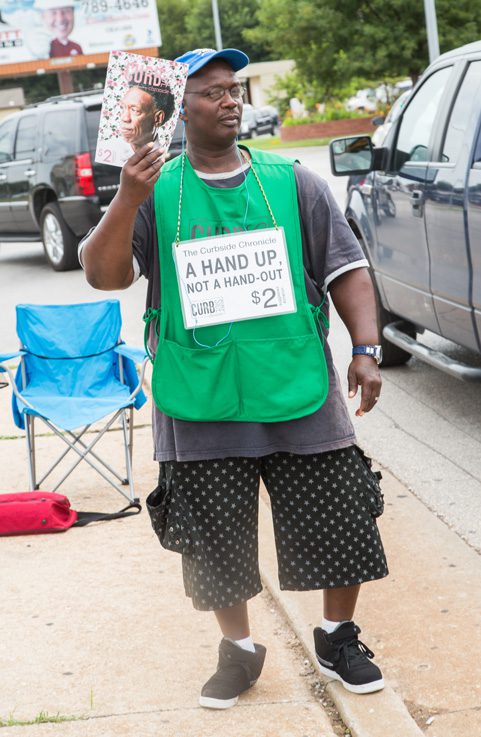
“It is often easy to ignore someone who is experiencing homelessness when you see them on the streets,” O’Connor says. “Often, our first instinct is to completely ignore this person and avoid eye contact. Act like you cannot see them. This is often because we do not know how to respond to this person’s current situation. Street papers provide a safe and empowering way for people experiencing homelessness to interact with the community at large. The magazine provides an easy start to conversation and gives people a natural reason to approach and interact with someone experiencing homelessness. Our goal is to bridge the gap between people experiencing homelessness and those who aren’t to provide both with a safe and comfortable environment for conversation.”
O’Connor adds that she has seen vendors get a boost in self-confidence and community involvement after being a part of the Curbside.
“Our vendors have mentioned numerous times how they feel like they are part of something bigger than themselves with the magazine,” she says. “They know that their hard work is breaking stereotypes about the homeless and that they are advocates for other people experiencing homelessness in OKC.”[pullquote]The Curbside Chronicle has educated the community about the needs of men and women experiencing homelessness and innovative approaches to meeting those needs[/pullquote]
One locally popular vendor for the paper is Robert Hatcher, a regular fixture at Belle Isle Station. In addition to selling the Curbside, he also spends his time assisting other homeless citizens of Oklahoma City and providing paralegal services. He says at first, he was hesitant to get involved as a vendor for the paper.
“Standing on a street corner felt like being a panhandler begging for money,” Hatcher says. “After taking the time to read the Curbside articles, I discovered that many homeless lives paralleled my trials and tribulations. Living in the streets isn’t easy. Time moves at a snail’s pace. Being a part of the Curbside Chronicle family has enriched my life, given me some essential benefits and helped me earn some money to meet my basic needs. Being a vendor is challenging work, but it is also rewarding for those who want to obtain housing and to take control of our lives and be able to hold your head up again.”
O’Connor and Hatcher agree that the high rate of homelessness in Oklahoma City stems from such issues as substance abuse, poverty, mental illness, job losses and lack of both health care and affordable rental housing – and that the Curbside is poised to educate citizens about these pervasive causes of homelessness.
“The Curbside Chronicle has educated the community about the needs of men and women experiencing homelessness and innovative approaches to meeting those needs,” Hatcher says. “We sincerely believe that homelessness is a journey, not a destination.”
For more information about the Curbside Chronicle, its mission and its vendors, visit its website at www.thecurbsidechronicle.org. Reach the papers and locate vendors via the paper’s Facebook and Twitter, @CurbsideOKC.


























